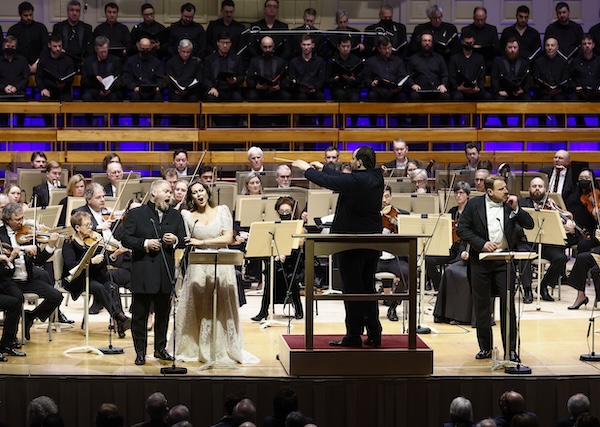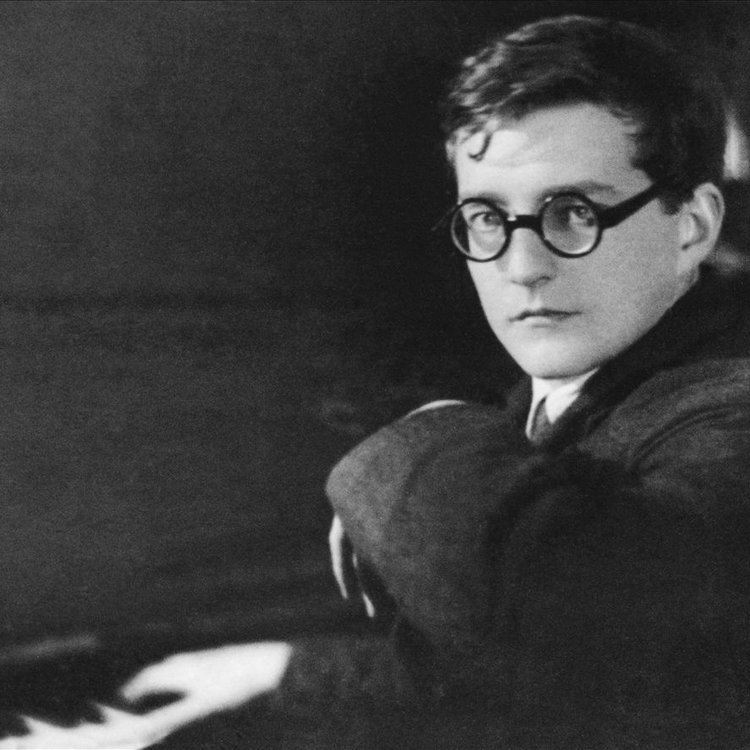Nelsons, Boston Symphony cut to the heart of Shostakovich with “Lady Macbeth”

Andris Nelsons conducted the Boston Symphony Orchestra in Shostakovich’s opera, Lady Macbeth of Mtsensk Thursday night. Singers are Brenden Gunnell and Kristine Opolais (left) and
Günther Groissböck (right). Photo: Winslow Townson
“In my beginning,” T. S. Eliot wrote in East Coker, “is my end.”
That was literally the case for the Boston Symphony Orchestra’s nine-year-long survey of Dmitri Shostakovich’s symphonic music: the first notes of the series didn’t belong to a symphony. Rather, they came from the Passacaglia from the opera Lady Macbeth of Mtsensk.
On Thursday night, the BSO and Andris Nelsons closed the circle, presenting the complete Lady Macbeth at Symphony Hall. Befitting the evening’s sense of occasion, the concert performance (which was taped for future release by Deutsche Grammophon) did double duty, marking both the completion of a major artistic initiative and celebrating the announcement, made earlier in the day, that the ensemble had extended Nelsons’ contract as music director indefinitely.
Though an opera whose plot turns on infidelity, murder, and betrayal might seem an odd choice for a festive occasion, opera-in-concert is one of the things Nelsons does best. And the act of presenting this particular score stands as a milestone in the conductor’s ten-year-long tenure with the BSO.
Composed between 1930 and 1932, Lady Macbeth unfolds with breathtaking fluency and invention. The freewheeling energy and biting dissonances that characterize Shostakovich’s Second and Third Symphonies turn up often.
So do echoes of the film scores the composer was playing (and writing) in the late 1920s, as well as dance hall ditties and folk music. What’s more, Lady Macbeth contains an astonishingly eclectic grasp of past composers that emerge freely and unexpectedly: the ghosts of Mussorgsky, Mahler, and Johann Strauss all find their way into its pages.
These points of reference all serve to convey and comment on the tale of a bored and frustrated wife, Katerina Izmailova, and the affair she embarks on with the hired hand, Sergei, to disastrous ends. Based on a novella by Nikolai Leskov, Shostakovich’s libretto, co-written with Alexander Preis, considerably softens the edges of the heroine. If her actions (which include poisoning her father-in-law and helping Sergei kill her husband) aren’t justifiable, they’re certainly understandable.
A popular and critical triumph after its premiere in 1934, Lady Macbeth fell afoul of Joseph Stalin’s aesthetic standards when he saw it two years later. The ensuing imbroglio altered the trajectory of Shostakovich’s career and resulted in the opera disappearing from the repertoire for a time.
Yet, as Thursday’s performance of the original, four-act 1932 version demonstrated, Lady Macbeth is really the key to unlocking Shostakovich’s larger style. Though after the Fourth Symphony he never again wrote such raucously dissonant music, the chief aspects of his later output—the quick shifts of tone; the raw virtuosity; the uneasy marriage of irony, sarcasm, and profundity utilized as subtle social and political commentary—all coalesce masterfully here. So, too, moments of penetrating vulnerability, like Katerina’s two arias in Act 4.
On Thursday, Kristine Opolais delivered both of those with searing intensity and a focus to match. She offered much the same in her compelling traversal of Katerina’s big Act 1 aria where the character laments her lonely, loveless life.
Yet these moments of full-blooded passion and fire were intermittent; elsewhere, Opolais’ Katerina was one-dimensional and demure. Her default tone was monochrome and the singer’s lack of projection in her lower range meant that, while some notes were simply covered by the orchestra, the ones that weren’t tended to sound anemic.
An occasional lack of dynamic nuance coupled with issues of balancing with a huge orchestra meant that her voice sounded nicely present in exposed spots but constrained during big ones. As a result, Opolais’ presence was subdued and underwhelming.
Granted, this wasn’t helped by Benjamin Richter’s cluttered staging, which basically had the soprano standing to one side of the podium for the whole night, including, strangely, while her character throws Sergei’s new lover, Sonyetka, off a bridge and then follows her into the icy depths of the Volga (most of the rest of the cast milled about the other side of the dais). But such was the contrast in dynamism between Opolais and Maria Barakova in her brief turns as Sonyetka that the latter left the stronger dramatic impression of the two for the whole night.
Brenden Gunnell’s Sergei proved similarly fitful. The American tenor has a pleasing, lyrical instrument and it was put to good use in his initial duets with Opolais and his later ones with Barakova. But his voice was no match for the orchestra playing above mezzo–forte; whenever that happened, Gunnell sounded like he was pushing himself.
Günther Groissböck’s sleazy Boris, however, had no trouble projecting or conveying vigor. Neither did Peter Hoare in his unexpectedly sympathetic turn as Katerina’s milquetoast husband, Zinovy.
Other impressive standouts in the cast of nineteen were Anatoli Sivko’s corrupt Chief of Police and Goran Jurić’s Priest. Meantime, Dmitry Belosselskiy and Patrick Guetti imbued their last-act cameos with breathtaking resonance and tonal depth.
The Tanglewood Festival Chorus, as prepared by James Burton, made light work of their several athletic moments in the score. Their account of the epic Act 4 choruses—stately, noble, mournful, beautifully voiced and enunciated—provided the evening its most haunting moments.
Yet the night’s biggest stars were Nelsons and the BSO. Yes, the usual balance issues presented themselves (the night’s huge orchestra extended into the seating area on Symphony Hall’s main floor). Yes, the orchestra leaned into the score’s quintuple forte indications with frightening enthusiasm; there also seemed, occasionally, to be some disagreement about what constituted a true piano. Yes, there were missed notes and the coordination of singers and instruments was periodically spotty.
But this is music of extremes of expressivity and character. It demands risk-taking. Nelsons and his band intuited as much.
They reveled in Lady Macbeth’s five orchestral interludes. The lurid Act 1 depiction of Katerina and Sergei’s lovemaking (surely one of the most violent and frenetic depictions of such in the canon) persuasively lived up to its early moniker as an example of “pornophony.” The Passacaglia, finally heard in its full context, unfolded with sweeping power and shape. The Keystone Kops-worthy music depicting the police rushing to arrest the murderous couple at their wedding was laugh-out-loud funny.
Additionally, the opera’s several moments of introspection were dispatched with care. Various instrumental solos—from guest concertmaster Nathan Cole, principal cellist Blaise Déjardin, principal oboe John Ferrillo, and English hornist Robert Sheena, particularly—stood out for beauty and intensity of execution.
Through it all, Nelsons’ direction was firmly attuned to the score’s dramatic pacing. Though the night was a long one—Thursday’s Lady Macbeth clocked in at just over three hours, intermission excepted—it was conspicuously lacking in longueurs. The end result was an evening of symphonic theater that, despite some imperfections, was monumental in nearly all the right ways.
The Boston Symphony Orchestra plays music by Tania León and Stravinsky 8 p.m. Friday. Shostakovich’s Lady Macbeth of Mtsensk will be repeated 7 p.m. on Saturday. bso.org
Posted in Performances


